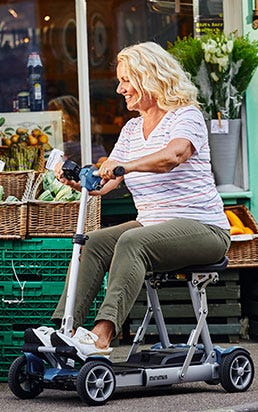In March 2020, the Government advised anybody who comes into contact with the coronavirus to self-isolate for 7 days, and that everybody over 70 years to isolate themselves for at least 4 months.
Schools were closed and everybody was asked to work from home if possible, and to socially isolate themselves from others.
This was all familiar territory for many elderly people with severe mobility problems who rarely get out of the house and sometimes have no visitors for weeks on end, and everybody can learn from how these people already cope. Here's the advice we wrote in 2020.
How To Aid Independent Living
The biggest challenge during this outbreak will be for those who currently require regular home visitors from care workers and family members to help with every day tasks from dressing and washing, to cooking, cleaning and dealing with letters and helping with medicine and doctors appointments.
If carers become unwell or are forced to isolate, many people with mobility needs will be left to fend for themselves, so it is vital to help them become more independent now.
Food and Shopping
Although some people have apparently stock-piled enough food to them months, most people have not had the opportunity or resources to do this.
Because people over 70 should really be in total isolation, and this means avoiding food shopping too. Helping elderly people set up a regular food delivery, or managing it for them, can be a life saver for many.
Delivery drivers may stop coming in doors, so be on hand to help with the shopping, or just do their shopping when you do your own, and deliver it yourself. Many shops now deliver and some give time slots many weeks in advance.
Washing
Staying clean is important but many people with reduced mobility find it harder to wash themselves. However, even without assistance it is possible for most people to wash themselves with the right equipment.
One of the biggest risks as we get older is actually falling over, so making a bathroom safer is the most important step. Install hand rails and grab bars next to baths, showers and toilets, as well as by the back and front doors.
Put down new anti-slip mats in the shower and bath. A good bath brush makes cleaning the whole body so much easier, whether you are sitting on a shower stool or having a bath, a long handled sponge allows you to reach everywhere from your back to your toes.
A good bath chair or shower stool is essential, even if just used by a basin. A wall mounted shower chair is a great way to provide support without taking up space.
Cooking
Cooking, preparing food and cleaning afterwards is a real challenge too. Teach your elderly relatives how to use a range of kitchen aids to allow them to do as much as possible themselves.
While in isolation it is important to have a good stock of tinned foods and pickles in jars, so a good tin ring pull opener and electric tin opener are all invaluable tools.
Many people like to eat their meals in the lounge these days, so a good non-slip tray, or better still, a handy Homehelp trolley, will help prevent spillages. Dropping food and drinks is not only an inconvenience, but it can cause some people a lot of stress and worry.
Sitting Safely
As mentioned earlier, falls are one of the biggest risks to health in elderly people, and as we grow older and weaker, falls become more likely and more common.
Just sitting down and getting up from an armchair can result in loss of balance and falling, so it is good idea to provide assistance with a riser / lift chair - these chairs gently lift you up to standing position, and sit you back down, so there is no need to struggle i the living room.
The result is people who use these chairs are far less likely to suffer from falls when using an armchair. They also recline, which means they can provide a comfortable place to snooze, and save a trip upstairs to the bedroom.
Getting Up and Going To Bed
An elderly person may need help both with getting up, and going to bed each evening. While getting out of bed may be nigh on impossible without assistance, that assistance does not have to come from a carer.
A profiling / care bed or an electric adjustable bed can quickly help somebody to sit upright and with a well positioned bed support or grab handle, more help is providing to swivel round and sit on the edge of he bed before standing up.
Medicine and Medication
If your role as a carer is to remind somebody to take their medicine it can be a worry not knowing if they are remembering or not. To help people remember to take their medicine you can use one of the many different pill boxes available.
Some hold just daily pills and have a regular alarm to remind it is time to take something, while others haves pills for a week or pills for a month.
Hygiene
Staying clean is as important as regular washing. If incontinence is a problem then some disposable bed pads are a good idea - they save you having to wash the sheets every day. Incontinence pads and all-in-one pants also provide protection during the day, which can help reduce worry and anxiety.
A commode is also a great idea for people with mobility issues, especially in bedrooms without en suites, or in living areas without a nearby toilet. Always keep some hand sanitiser close by for when it is not possible to get to a basin to wash.
Mobility Around the Home
If somebody finds it hard to get around the home and usually waits for home help to be most active, then it might be a good idea to invest in a small and cheap powerchair, such as the Fenix or the Easi-Go. These can also travel out on pavements. A good quality grabber can also be a lifesaver - literally a helping hand.
Staying Active
It is important to encourage people to stay active, as long-term inactivity can lead to a reduction in mobility. If somebody has a garden and experience with gardening in the past, it is a good idea to encourage them to use it as much as possible - you could even help them grow some vegetables.
If getting out in the garden is too much then indoor exercise is possible. We have several pedal exercisers and resistant bands that aid physical fitness and help maintain muscle, which is essential to help stay strong and fit - head to our exercise and fitness department to learn more.
Communication
Communication is going to become harder for people who rely on regular face to face meetings with carers and friends.
While the younger generations have taken to mobile phones and tablets with ease, many elderly people still do not have a mobile phone. If your parents rely on social visits then now is a good time to get them set up with a tablet and teach them how to use Skype, WhatsApp or FaceTime to stay in touch.
A video door phone is also a good idea as it will allow people to speak to visitors without opening the door first. And if they are hard of hearing, or have poor eyesight, a big button telephone with amplifier is a lifesaver.
Socialising
Because almost all social gatherings have been banned or encouraged to close, people who were already a little isolated may find themselves completely isolated during the coronavirus outbreak.
So, if possible, see if you can still visit, even just to say hello at the door and help read some post or see if they need anything else from the shop.
We are certainly expecting some difficult times over the months ahead, but with a little planning and some clever gadgets, it is possible to help elderly people carry on living alone without abandoning them completely


 Price Match Promise
Price Match Promise
 Next day delivery, 7 days a week
Next day delivery, 7 days a week
 Nationwide Showrooms
Nationwide Showrooms
 Rated Excellent
Rated Excellent







